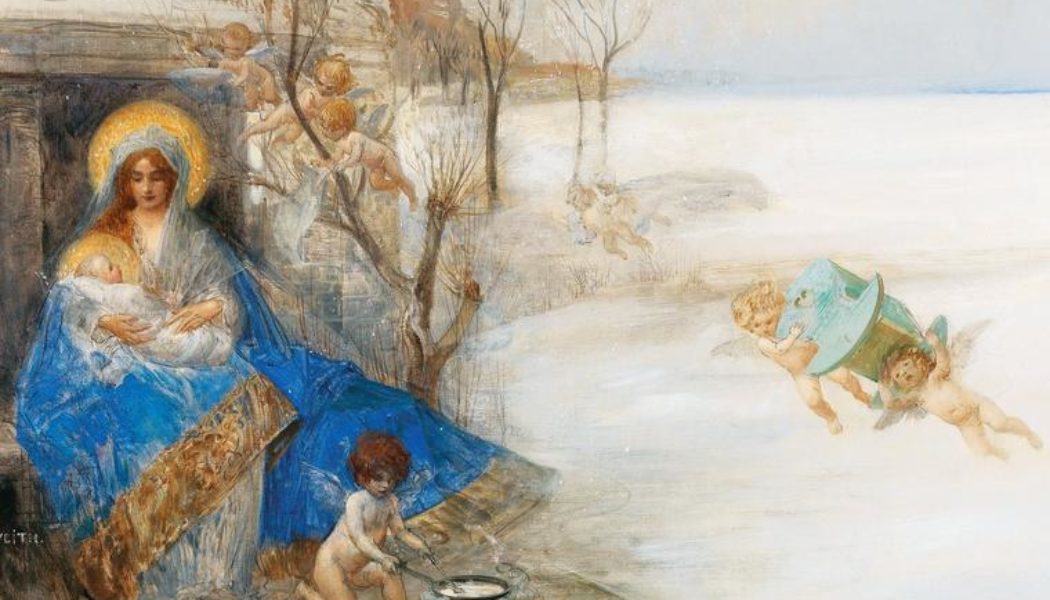
Recently, I watched a 2017 interview with author Kazuo Ishiguro, talking about his 1988 novel Remains of the Day. He at one point made the statement that most of us, like the novel’s protagonist (a stoic and loyal British butler), essentially inhabit small worlds.
As a mother, I find myself reflecting often upon my own small world. It is countercultural to accept, much less embrace, the smallness and hiddenness that motherhood demands. Social media has mitigated this to some degree — look, here’s a picture of the mess my toddler just made, and here we are feeding giraffes at the zoo — but overall, the smallness remains. (All the oversharing really serves to do is to confirm mothers in their suspicion that if it isn’t seen, it doesn’t matter, thus conditioning women to believe that dignity is dependent upon something at odds with the very nature of motherhood.)
Back when my children were very young, I was in a moms’ group at church, where we read a book that I can only describe as, funnily enough, anti-mom. Of course, it wasn’t really quite so straightforward, but the author’s argument was that we as a culture have placed motherhood on such a high pedestal, and that we women are not only being crushed under the oppressive weight of motherhood, but also squandering our gifts and talents that could otherwise be helping further God’s kingdom.
The the author lamented having to play Legos with her children, because it wasn’t intellectually or spiritually stimulating and, therefore, a waste.
Is this what people think at-home mothers are doing, I wondered? Playing blocks all day, letting their simultaneously addled and overstimulated brains atrophy? Ignoring their calling from God?
I was not Catholic at the time, and so had not yet encountered the Catholic Church’s wisdom concerning the profoundly beautiful design God has for marriage and children. But as an at-home mother who really valued raising my children, who believed that there is dignity and value in mothering and homemaking and presence, I immediately found the author’s arguments short-sighted and — ironically, considering she was a fairly progressive feminist — overly rigid.
Why, after all, must a woman have to choose between a rich intellectual and spiritual life and raising a family? When did the common conception of being within the home become associated with sitting and playing with toys for hours on end? And what happened to the collective Christian imagination, where now people believe that being a wife and a mother detracts from one’s very calling by God?
The problem with the book, as with so many modern conceptualizations of motherhood, is the tendency to place biology and the natural order of things over and against self-actualization and fulfillment. Surely the secret to a fulfilling and meaningful womanhood, the moderns say, lies in conquering and diminishing the capacity for procreation. Hence the birth-control pill and the scourge of abortion, and perhaps just as insidious, the deep and unrelenting tension between womanhood and calling. What should my life look like? Does my life have meaning?
The modern thinking on this unfortunately settles on the notion that children inhibit a happy and good life. So women must either engage in battle against their very bodies, designed with the possibility of bringing forth life, or settle into a dull and resentment-filled existence where we count down the days until the children are sleeping through the night (or done with diapers, or going to school each day, or old enough to leave the house) and we can resume life as it should be.
Surely there is a better, more hopeful path forward.
And it begins, I suspect, with developing an understanding of the intersection of womanhood, vocation and the nature of dignity. If we are made in the image and likeness of God, called to the vocation of marriage, and consequently asked to be open to becoming cocreators with God, then we need not ever wonder whether our raising of children and making of a home is worth the effort or, even worse, detracting from our relationship with God or a life lived for Jesus. It is God who gives us this capacity, after all, and he is pleased, not disappointed, when we lean into it with faith, hope and love.
We must ultimately lead the culture then in recovering a proper, robust imagination when it comes to womanhood and the vocation of marriage. It begins with our acknowledgment that we are created for small worlds, for the hidden and mundane things. Far from being diminished by this, it instead animates our purpose and infuses life, even daily life, with beauty and meaning. The dishes, the meal preparation, the changing of diapers — there is value there in the work and the sacrifices. The sorrows, the disappointments, the unrequited longing for a child — these things, too, will bear fruit and be transformed from ashes into beauty by a God who sees, loves and redeems.
There is space, then, in the small world, for contemplation, relationship and fulfillment. There is room for creative pursuits, the appreciation of art, the cultivation of culture. The home, after all, is where society begins and ends, where prayers are prayed, dreams are dreamed, and faith is formed. Where hearts and minds and the very culture are shaped.
The problem is not, it turns out, that we have placed too high a value on motherhood. Nor is it that we don’t honor that most noble of undertakings enough. Rather, the issue is that we somehow managed to lose our collective imagination somewhere along the way. But there is, always and forever, hope. It is possible, with God’s help, to reclaim the beautiful life available to women within the domestic confines of the small world.








